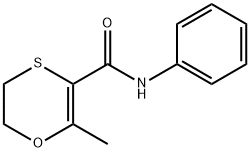Carboxin:Uses,Toxicity,Environmental Fate
May 5,2023
Carboxin is a systemic fungicide used to control seed and seedling diseases; (smut, rot, blight) on barley, beans, canola, corn, cotton, oats, onions, peanuts, rice,rye, safflower, sorghum, soybeans, triticale, and wheat. Formulations include wettable powder, dust, flowable concentrate, emulsifiable concentrate, and ready to-use liquid.

Uses
Carboxin is a systemic anilide fungicide. It is used as a seed treatment for control of smut, rot, and blight on barley, oats, rice, cotton, vegetables, corn, and wheat. It is also used to control fairy rings on turf grass. Carboxin may be used to prevent the formation of these diseases or may be used to cure existing plant diseases.
Toxicity
Carboxin has been shown to have low acute toxicity. Toxicity Categories, which range from I (most toxic) to IV (least toxic), were III for the oral route of exposure, IV for inhalation, and III for dermal. Carboxin is a slight eye irritant (Toxicity Category III), is not a skin irritant (Toxicity Category IV), and is negative for dermal sensitization. The mechanism of toxicity for carboxin has not been fully investigated; however the primary target organs appear to be the liver and kidney. In carcinogenicity studies in rats and mice, carboxin did not demonstrate any significant evidence of carcinogenic potential.
Environmental Fate
Carboxin is a very mobile compound that degrades rapidly in soil by aerobic metabolism with a mean half-life of 1.25 days. Carboxin degraded much more slowly in anaerobic soil with a half-life of 128 days. In both aerobic and anaerobic soil studies, the predominant degradate was carboxin sulfoxide which forms quickly, is more persistent, and is more mobile than the parent compound. Based on the structure of carboxin sulfoxide, the toxicity of the sulfoxide degradate is likely comparable to that of the parent compound carboxin.
- Related articles
- Related Qustion
- Carboxin: Biodegradation and Preparation Method Apr 10, 2024
Carboxin, a key fungicide in agriculture, inhibits fungal growth effectively while Delftia sp. HFL-1 degrades it and its metabolite, offering sustainable solutions.
- Carboxin: mechanism of action, applications and cardiotoxicity Oct 18, 2023
Carboxin is a systemic fungicide effective against fungi, but its cardiotoxicity in zebrafish embryos highlights potential risks to non-target organisms.
- What is Carboxin? Aug 31, 2021
Carboxin is a heterocyclic fungicide with systemic effect. This product is effective against Rhizoctonia, and is especially suitable for seed treatment of cotton, peanuts, vegetables and sugar beets.
RAD140 has engraved its position as a performance enhancing drug in the fitness community. In general, gym-goers perceive it as a substance that contributes to the growth of leaner muscles while building superhuman strength.....
May 4,2023APICymoxanil is a fungicide that is highly soluble in water and considered quite volatile. It has a low potential for leaching to groundwater, is non persistent in soil and water systems.Cymoxanil is moderately toxic to mammals, may cause adv....
May 6,2023Chemical pesticides ?Carboxin
5234-68-4You may like
- Carboxin
-

- $185.00 / 1KG
- 2020-11-18
- CAS:5234-68-4
- Min. Order: 1KG
- Purity: 99
- Supply Ability: 1000KG
- Carboxin
-

- $0.00 / 25Kg/Bag
- 2020-03-24
- CAS:5234-68-4
- Min. Order: 25KG
- Purity: 98%
- Supply Ability: 100tons
- Vitavax
-

- $1.00 / 1kg
- 2019-07-06
- CAS:5234-68-4
- Min. Order: 1kg
- Purity: 99%
- Supply Ability: Customized





